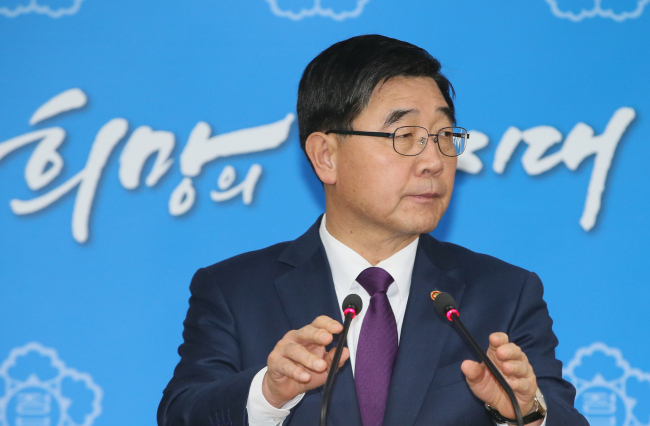The South Korean government mapped out its plans to curb labor market duality to build a fairer business ecosystem and toughen security at the country’s major airports in a policy meeting held Thursday.
In the meeting chaired by Prime Minister Hwang Kyo-ahn, the Employment and Labor Ministry unveiled measures to root out business practices that disadvantage smaller employers and non-regular workers under the dual structure of the country’s labor market.
 |
(Yonhap) |
The plans are a mix of financial incentives and stepped-up monitoring to reduce the gap in competitiveness between large and small companies and in treatment between regular and non-regular workers.
The government plans to expand financial support for conglomerates willing to give regular status to non-regular workers by covering 70 percent of their wages for one year. It will also give tax incentives to companies signing contracts with subcontractors hiring fewer irregular workers.
It will also beef up monitoring of 20,000 enterprises in the manufacturing industry to punish employers who illegally recruit workers -- many of who are young -- through subcontractors and exploit them through unreasonably long working hours.
To better protect workers with a temporary status, the government plans to create a standard contract form based on legally binding labor conditions and make it mandatory for businesses to offer the same welfare benefits for non-regular workers as well.
The move comes amid mounting worries over the widening labor market duality in the country that is linked to the nation’s low productivity, lack of quality jobs and wage disparity.
According to Statistics Korea, there were 6.27 million workers with irregular status last year, accounting for 32.5 percent of the entire labor force in the country.
The monthly wages of irregular workers stood at an average of 1.46 million won ($1,215), about half the wages of regular workers at 2.69 million won per month. Irregular workers are not protected by pension, health and employment insurance. Many of them are also excluded from incentives, overtime pay and paid holidays.
The Organization for Economic Cooperation and Development pointed out in its 2015 Employment Outlook that major challenges facing the nation’s economy are the high incidence of non-regular work, coupled with low mobility from non-regular to regular jobs, and large wage gaps between small enterprises.
“It is important to reduce Korea’s labor market duality and to strengthen access to well-tailored vocational training services so that more workers can move up the career ladder to better jobs,” it said in the report.
The government has blamed the nation’s “strong” labor unions with high membership of regular workers for protecting their interests at the expense of irregular workers. It saw labor unions and the rigid market as factors which encouraged companies to hire non-regular workers rather than create new jobs.
Only 2.8 percent of the irregular workers in the country joined a labor union, while 12.1 percent of salaried workers in Korea are members of labor unions.
“The government’s efforts for policy implementation has its limits to improving the market duality fundamentally,” the labor minister Lee Ki-kown said in the meeting, urging the National Assembly to pass a set of labor market reform bills.
But the Korean Confederation of Trade Unions, one of the nation’s largest trade unions, slammed the plan, calling it a repetition of already failed policies. It also accused the government of implementing business-friendly polices at the cost of laborers.
In the policy meeting, the government also revealed a plan to tighten security at the country’s major airports following a series of security breaches.
Under the plan, doors of immigration checkpoints will be closed after working hours and security cameras will be installed to monitor major locations at the airport.
The ministry will also enhance cooperation with the Ministry of Justice, the airport council and relevant agencies to share information about potentially high-risk passengers. It will also prescreen passengers before airliners issue boarding passes to keep potential terrorists from entering the country.
By Ock Hyun-ju (
laeticia.ock@heraldcorp.com)







![[Today’s K-pop] Blackpink’s Jennie, Lisa invited to Coachella as solo acts](http://res.heraldm.com/phpwas/restmb_idxmake.php?idx=644&simg=/content/image/2024/11/21/20241121050099_0.jpg)
